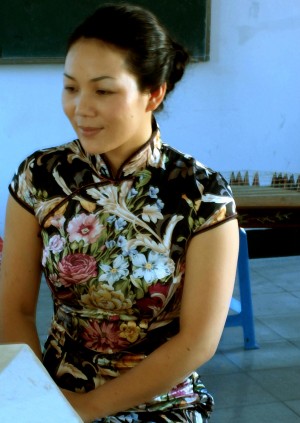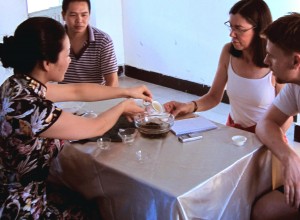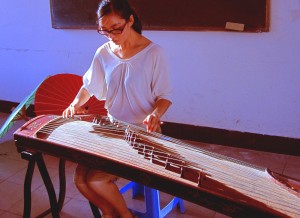
Our arrival in Fuzhou, the capital of Fujian province was held up with delays on the tarmac, delays on the bus and delays finding a cab. Demand for cabs in this bustling city is so great during rush hour that some people have taken to accepting fares on the backs of their electric bikes. With all these back ups, I was becoming impatient and worried that our lateness might be insulting our host, Chris West of Min River Tea Farm. I discovered though, that in China, people are used to waiting and they find a way to work with that. He was relaxed and not at all surprised that we had so many delays. “You settle in”, he said “and then we’ll head over to Mrs. Li.” It was a relief that Chris is a Mandarin speaker. He is from the UK, but has been in China long enough to become fluent in the Fuzhou dialect.

Capital Training College
We arrived at Capital Training College, the vocational school where Mrs. Li teaches young women the refinements of tea culture. Mrs. Li, her little daughter, several pupils past and present, and I think, her husband, had been waiting for us for hours in the sparsely appointed classroom in sweltering heat. They were welcoming and cheerful and eager to share info about the school. For some reason, I had conjured Mrs. Li to be an older, slightly cranky woman (maybe that better describes my state at the time). She is quite the opposite – in her early 30’s – a lovely woman with a contemporary attitude toward tea even if she was wearing the traditional Qipao 旗袍. (Check out this Shanghai design site, My Qipao)


Chris knew that I would be interested in seeing her classroom and learning about her curriculum as I am a Tea Sommelier graduate from a course offered at George Brown College in Toronto. Chris told me that there are over 20,000 tea rooms in Fuzhou, some apparently fronts for less legitimate activities such as gambling, but most are beautifully appointed rooms where business is conducted or special guests are honoured in the presence of tea. Mrs. Li’s students are all young women who are trained in the artful techniques of tea preparation. At this school, the hand choreography is equally as important as understanding the story behind all types of Camellia Sinensis tea, their origin (terroir) and their method of preparation. They learn Gongfu preparation, but this is not the emphasis.



One might refer to Mrs. Li’s tea students as tea “hostesses” but this term doesn’t encompass the full range of skills that they learn, such as musical artistry and poetry. Mrs. Li and one of her students demonstrated their skills on the GuZheng 古箏, a zither-like instrument. An accomplished tea presenter will also have knowledge of interesting topics to discuss in case her client’s conversation lags.

The graduates receive official certificates and seem to have no trouble finding work. Some have even opened their own tea houses. It is remarkable to me that the cultural environment of China is such, and tea is valued so highly, that a study of the fine art of tea preparation can be economically feasible. In Canada we have Colleges producing Tea Sommelier graduates by the dozens every year, but without the culture to support them professionally. It is a constant source of frustration for me that here in North America, premium loose leaf tea and all the stories that enhance it are lost on most people.
I wouldn’t want to live their lives, but I do envy these graduates of Capital Training College the ease with which they are able to purvey their nation’s treasured beverage.



